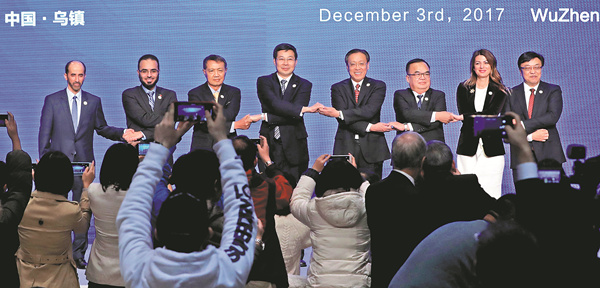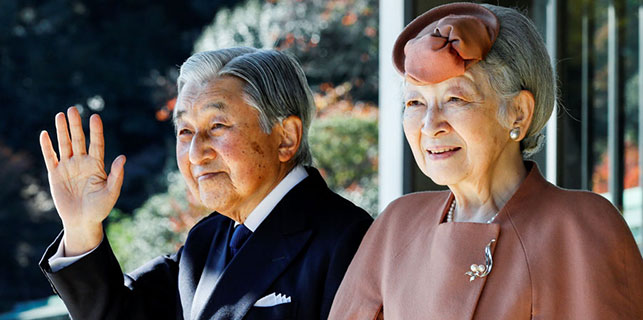Wuzhen is building a strong foundation for the Internet's future
 |
|
Chinese delegates Zhuang Rongwen and Lin Nianxiu and those from Laos, Thailand, Turkey, Serbia, United Arab Emirates and Saudi Arabia at a Belt and Road Initiative event pose at the fourth World Internet Conference in Wuzhen, Zhejiang province, on Sunday. Zhuang (fourth from left) is Cyberspace Administration deputy head. Lin (fourth from right) is National Development and Reform Commission vice-minister.WU ZHIYI / CHINA DAILY |
In the early days of the internet during the late 1960s, the technology wasn’t purely meant for a worldwide access. It existed among a few interconnected networks in the United States and later joined by others in Europe. Later on came the World Wide Web (www), of which credit is given to Sir Tim Berners-Lee.
Today the internet is accessible across the globe, from Wuzhen in China to Timbuktu in Mali, from the Samoan islands in the Pacific to the West Indies, and from Mumbai in India to all of Eastern and Western Europe, leaving it footprints in areas far from where it sprang.To take a cue from President Xi Jinping’s 2016 statement, “the development of the internet knows no national or sectoral boundaries”.
This is true of this year theme for the 4thWorld Internet Conference held in the water town of Wuzhen, Zhejiang province, “Developing Digital Economy for Openness and Shared Benefits-Building a Community of Common Future in Cyberspace”. And I will add “with no boundaries”.
I am particularly interested in the keywords, “Shared Benefits and Common Future”. In our current digitized age of the internet of things (IoT), and high-tech products, the question I ask myself is, “what will be the future of the internet” with regards to the foundation currently being laid, bearing in mind that a century or two from now, our age of internet would be regarded as primitive?
To answer before I make a deduction, I say the internet today is supreme to what may come after it, simply because this is the foundation. Our generation is in the process of building a community of common future in cyberspace with a strong solid foundation in security, openness, and shared benefits, as themed for this year’s conference.
When Sir Tim, using the existing internet as foundation, created the web, quite rudimentary from what we see today, he specifically asked his superiors at the European Council for Nuclear Research (CERN) to allow the innovation to be shared freely in order for the web to grow. And so it did. Decades later, that commitment to share has revolutionized the 21st century.
In local parlance, we say “sharing is caring”- the transfer of internet technology has transformed lives and changed communities across the globe. We are now in the age of big data and internet plus where information is shared across a wide range of platforms such as smart health, e-commerce, and internet finance, smart tourism, agriculture and areas including education and energy which have become 21st century marvels.
In Africa for example, in South Africa there is Snapscan, a mobile payment application, clones of Apple Pay and WeChat Pay that works using QR codes. In Kenya and Nigeria there is Sendy, an Uber-style motorbike delivery service that allows users to track their delivery via a phone application and in Ghana there is Paysail, a unique out-of-the-box payroll management application that organizes employee payroll embedded with Ghanaian tax codes. These are just a few of the innovation superhighway taking place on the continent as a result of shared internet technology.
In the US, China, Japan and South Korea, the internet is shaping technologies like Artificial Intelligence (AI) and Virtual Reality (VR) and Augmented Reality (AR). Both large and small enterprises are adopting these technologies which incorporate the internet as a key element to promote their business and services. Sectors including design, cars, gaming, property, e-commerce, property and real estate are being transformed to what the future will look like.
These are some of the great advantages of the internet, which far supersedes the challenges we are encountering currently. Although the sophistication of cybercrime and the use computers for espionage remains unabated, the benefits of the internet are enormous.
In building a community of common future in cyberspace, security is of utmost importance, therefore ensuring that cyberwarfare for example is kept at bay is one of the key policies I hope would be strongly mooted at the conference to be attended by experts from fields including cyber security.
In sum, the ultimate purpose of the Wuzhen Conference, the fourth in as many years, is seeking for inclusiveness in the development of the internet for the greater good, which is why the internet should have no national or sectoral boundaries as stated by President Xi.
The author is a former Ghanaian Journalist.
















